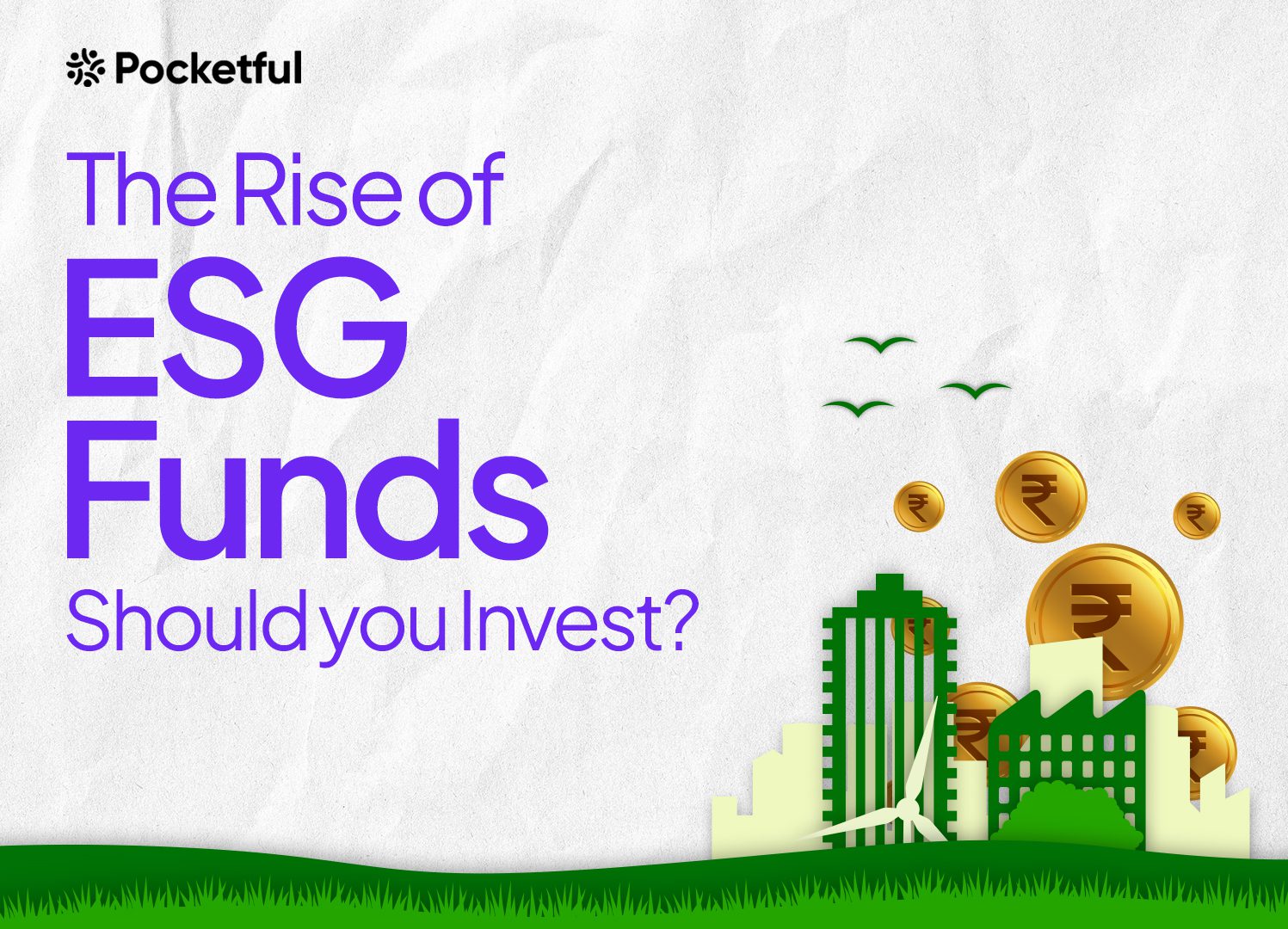| Type | Description | Contributor | Date |
|---|---|---|---|
| Post created | Pocketful Team | Mar-19-24 | |
| Add new links | Nisha | Mar-12-25 |

- Blog
- the rise of esg funds overview growth pros cons and suitability
The Rise of ESG Funds: Overview, Growth, Pros, Cons, and Suitability

ESG investing has gained a lot of momentum in the past years. So, AMCs followed suit and created mutual funds targeting sustainable investing. The idea has come a long way and shows no signs of slowing down. Let’s dive into the blog to see the rise of the ESG era.
Overview of Sustainable Investing
Sustainable Investing involves making capital allocation decisions based on socially responsible and ethical strategies to ensure portfolio companies maintain a high standard of sustainability principles. ESG is the benchmark that measures a company’s sustainability and societal impact.
- “E” – Environmental factors include a company’s carbon emissions, water usage, waste management practices, and the impact of its operations on the environment.
- “S” – Social factors include a company’s impact on local communities, employee relations, human rights, and diversity and inclusion policies.
- “G” – Governance factors include a company’s board structure, executive compensation, transparency, and accountability.
These important factors attract investors who practice sustainable investing and target financial returns while contributing to a positive social and environmental impact. Investors believe sustainable and socially responsible companies are more likely to generate long-term returns and mitigate risks.

Growth of ESG in India
The growth of sustainable investing in the country has led to a significant increase in the demand for ESG funds. As per a report by Refinitiv, ESG investing is set to become mainstream in India in the next few years. The report predicts that ESG investing will account for 20-30% of India’s total assets under management by 2025.
Some ESG factors are given below:
| Environmental | Social | Governance |
|---|---|---|
| Energy Consumption | Human Rights | Quality of Management |
| Pollution | Child and forced labor | Board Independence |
| Climate Change | Community Engagement | Conflicts of Interest |
| Waste production | Health and Safety | Executive compensation |
| Natural Resource Preservation | Stakeholder relations | Transparency & disclosure |
| Animal welfare | Employee Relations | Shareholder rights |
Pros and Cons
Pros
- Investing in ESG funds can positively impact social change in the economy, as it invests in companies with good ratings in ESG factors.
- As ESG funds gain more popularity, companies realize the importance of sustainable development, and thus, they take proactive measures to improve their ESG ratings.
- Some studies suggest that companies with strong ESG practices may be more likely to beat traditional funds in the long run.
Cons
- As we know, ESG is new in the market, so the data regarding its return and volatility are insufficient.
- ESG funds lead to sustainable growth, which means they are better in the long run, but returns may not be good in the short term.
ESG Score
ESG scores are essential for investors to assess a firm’s sustainability and ethical performance. These scores range from 0 to 100; a score of less than 50 is considered relatively poor, and more than 70 is considered good. ESG scores are allotted to companies by research organizations like MSCI, Sustainalytics, and Morningstar.
For example, MSCI has a scale as shown below:
This snapshot reflects how well the firm manages its ESG risks versus its peers. So, a company with AA and AAA scores will be an industry leader in managing its ESG risks.
Top Holdings of ESG Funds
Let us have a look at the various ESG Mutual Funds in India with their top 5 holdings:
| Fund name | Top 5 holdings |
|---|---|
| SBI Magnum Equity ESG Fund | Infosys Ltd., HDFC Bank Ltd., TCS Ltd., ICICI Bank Ltd., L&T Ltd. |
| Mirae Asset ESG Sector Leaders ETF | Infosys Ltd., HDFC Bank Ltd., HDFC Ltd., Reliance Industries Ltd., TCS Ltd. |
| Axis ESG Integration Strategy Fund | HDFC Bank Ltd, Avenue Supermarts Ltd., TCS Ltd, Bajaj Finance Ltd., Kotak Mahindra Bank Ltd. |
| Aditya Birla Sun Life ESG Fund | Axis Bank Ltd., Infosys Ltd., HDFC Bank Ltd., Bajaj Finance Ltd., State Bank of India |
| ICICI Prudential ESG Fund | Infosys Ltd., TCS Ltd., HDFC Bank Ltd., Divi’s Laboratories Ltd., Marico Ltd. |
Return Comparison with Index
| Particulars | 2020 | 2021 | 2022 | 2023 |
|---|---|---|---|---|
| S and P BSE TRI (%) | 16.84 | 26.53 | 6.03 | 23.23 |
| ESG Category Average (%) | 20.12 | 33.38 | -2.10 | 25.43 |
This graph showcases that the returns delivered by the ESG category can beat the index by a significant margin in most of the past years. However, the graph also indicates increased volatility as it delivered negative returns in 2022.
Hence, the higher risk-to-reward ratio offered by ESG funds is exposed in the graph, which might incentivize long-term investors to park their funds.
Read Also: Explainer on ESG Investing: Overview, Pros, Cons, Background, and Mutual Funds
Conclusion
The rise of ESG funds reflects a growing trend towards sustainable investing, with investors seeking to generate financial returns while contributing to positive social and environmental impacts. The growth of ESG investing in India is driven by increased awareness, government initiatives, and the renewable energy sector, indicating a shift towards a more sustainable future with superior financial returns.
However, before investing in these funds, you must consider all your risk factors.
Frequently Asked Questions (FAQs)
Are ESG funds a good investment?
The research showed that sustainable funds have consistently demonstrated a higher downside risk than the index. Hence, a careful analysis of the risk-to-reward ratio needs to be performed before investing in an ESG fund.
Which is the oldest ESG fund in India?
SBI Magnum Equity is the oldest ESG fund, and it was launched in 2013.
Why is it necessary for ESG funds to exist?
ESG is an ethical investing strategy that helps people align investment choices with personal values. Therefore, ESG funds must exist in order to compel companies to improve their ESG scores.
What is ESG?
Environmental, social, and governance factors (ESG) are used to evaluate a company or investment’s sustainability.
What are the four pillars of ESG?
The four pillars are principles of governance, planet, people, and prosperity.
Disclaimer
The securities, funds, and strategies discussed in this blog are provided for informational purposes only. They do not represent endorsements or recommendations. Investors should conduct their own research and seek professional advice before making any investment decisions.